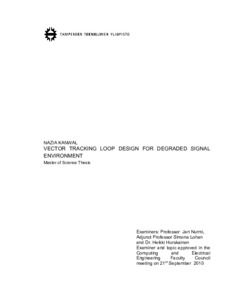Vector Tracking Loop Design for Degraded Signal Environment
Kanwal, Nazia (2011)
Kanwal, Nazia
2011
Master's Degree Programme in Information Technology
Tieto- ja sähkötekniikan tiedekunta - Faculty of Computing and Electrical Engineering
This publication is copyrighted. You may download, display and print it for Your own personal use. Commercial use is prohibited.
Hyväksymispäivämäärä
2011-06-08
Julkaisun pysyvä osoite on
https://urn.fi/URN:NBN:fi:tty-2011062014727
https://urn.fi/URN:NBN:fi:tty-2011062014727
Tiivistelmä
The performance of GPS degrades significantly in urban canyons and in indoor environments. There has been significant research in order to enhance the performance of a GPS receiver in such challenging environment but still the traditional GPS receivers fall short of optimal performance in degraded signal environment where the carrier to noise density ratio(?C/N?_0) drops significantly and when GPS signal is obstructed by the surrounding environment. Improving GPS receiver performance in GPS challenged environment has become one of the very important driving factors of ongoing research in the field of GPS technologies.
This thesis presents a modern GPS receiver architecture which is based on vector tracking loops. Traditional GPS receivers employ scalar tracking loops for tracking the satellite signals. Scalar tracking loops treat each channel independently. Therefore aiding of weaker satellite signals is not possible by the stronger signals. In a standard GPS receiver a Delay Lock Loop is used to track the Pseudo-Random Noise (PRN) sequence and a Costas loop is used to track the carrier part of the signal. On the other hand, vector tracking loops process the signals in an aggregate way and can provide better tracking in degraded signal environment. The task of tracking and navigation is done in one algorithm by using an extended Kalman filter. Due to the coupling of tracking and navigation in one processor aiding of weaker signals by the stronger signals is present. With vector tracking approach GPS receiver can take advantage of the redundancy of the GPS measurements that is not possible in the traditional GPS receiver architecture. A vector delay lock loop based on non-linear discriminator function has been implemented in this thesis and its ability to reacquire signals after momentarily blockage has been studied. The simulation results show the better performance of VDLL than conventional tracking methods. /Kir11
This thesis presents a modern GPS receiver architecture which is based on vector tracking loops. Traditional GPS receivers employ scalar tracking loops for tracking the satellite signals. Scalar tracking loops treat each channel independently. Therefore aiding of weaker satellite signals is not possible by the stronger signals. In a standard GPS receiver a Delay Lock Loop is used to track the Pseudo-Random Noise (PRN) sequence and a Costas loop is used to track the carrier part of the signal. On the other hand, vector tracking loops process the signals in an aggregate way and can provide better tracking in degraded signal environment. The task of tracking and navigation is done in one algorithm by using an extended Kalman filter. Due to the coupling of tracking and navigation in one processor aiding of weaker signals by the stronger signals is present. With vector tracking approach GPS receiver can take advantage of the redundancy of the GPS measurements that is not possible in the traditional GPS receiver architecture. A vector delay lock loop based on non-linear discriminator function has been implemented in this thesis and its ability to reacquire signals after momentarily blockage has been studied. The simulation results show the better performance of VDLL than conventional tracking methods. /Kir11
